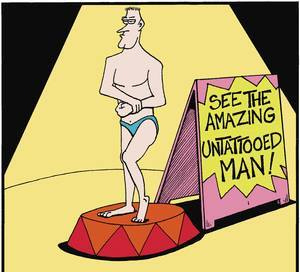A poll — as far as I know — has never been taken asking: How many of those voters with tattoos voted for Trump?
Yes, it's somewhat of an inane idea that would irritate people. Though tattoos might be displayed freely, attaching motives to acquiring them could be deemed private much less an extension of voting habits. Also, some would argue there's a built-in bias when asking the question.
Maybe 25 years or so ago that argument could be used against asking the question. Tying voting for a particular candidate and tattoos implied both the person running for election and his or her voters were of questionable character, potential losers. Now the argument still could be made about Trump's civic standing sans a tattoo, but not so his voters. Tattoos are too pervasive even if seeing them irritates some.
Statistics show that 26 percent of Americans had at least one tattoo in 2021. Interesting that share was a decrease from 30 percent in 2019. Whether that had to do with Biden's electoral win the following year could be a graduate sociological research project. The latest stats from the Pew Research Center indicates the figures have rebounded — 32 percent overall with 22 percent with more than one tattoo.
If one buys into the premise that low-informational people voted for Trump then the tattoo educational breakdown gives it some weight. Those without a college degree and considered lower income had one or more tattoos than the more well-to-do. Women seem to fall into that category as they have more tattoos than men. Black Americans and Hispanics have more tattoos, statistically, than White Americans. Those with higher incomes and more education tend to shy away from tattoos. One could say this points to the right-wing argument that Harris voters are "elite" and a distance from real, ink-bearing Americans. It's also a marker for economic inequality.
All this could mean nothing about the voting electorate. Tattoos appear in every country, most every culture, both democratic and authoritarian. However, displaying a tattoo isn't welcomed everywhere. Yet tattoos have a long history within the human race. A 2,500-old mummy of a woman called the Siberian Ice Maiden was found with a large Scythian deer tattooed on one shoulder. Egyptian mummies with tattoos from 3000 BC have been found.
It's possible a mini backlash could be brewing in America. Gone are the days of criminals, bikers and sailors and other antiestablishment types only got tattoos. The inverse has happened. Memes have appeared questioning the tattoo mania. One posted stated: "Zero tattoos is a sign of defiance to the mainstream culture." Maybe agreeing with that meme keeps me ink free. Though I have to admit I've thought about it.
In the early 1980s interest in black and white photography and writing about art and artists had me becoming a minority owner of an art gallery. To promote the gallery we published a quarterly art journal presented in black and white. They were heady times, at least for a short while, especially after we hosted an exhibit of black and white photos of people draped in tattoos. The naked shots left little to imagine stirring the carnal interest in the onlookers. It was hard to top the success of that show. Nowadays, traveling Tattoo Festivals appear in cities drawing affinity seeking crowds. Though calling tattoos a "hip thing" is wearing off, it's still considered a fashion accessory and even fashion itself.
Tattoo parlors now are part of strip malls. A smart parent with a visionally creative child and little money for art school could encourage the child to become a tattoo artist instead. The money is there. Tattoos are self-perpetuating, every design is a marketing tool and a boom to artists. It can be displaying a uniqueness . . . just like anyone else. Personal expression is one reason given as to why people get tattoos. But personal expression could be argued as the purview of the tattoo artist. Is hanging a reproduction of a Picasso print in your home an expression of you or of Picasso? The likely answer is both.
Psychologists say the main reason someone gets a tattoo has to do with its personal meaning. Sixty-nine percent of tattooed adults in the U.S. say they got inked to “honor or remember someone or something,” while 47 percent say they wanted to make a statement about their beliefs, and 32 percent say they got tattooed to improve their personal appearance. Turns out many of our tattooed counterparts around the world had similar motivations.
So, did more tattooed persons vote for Trump? One would have to view that person's tattoos, then ask.


